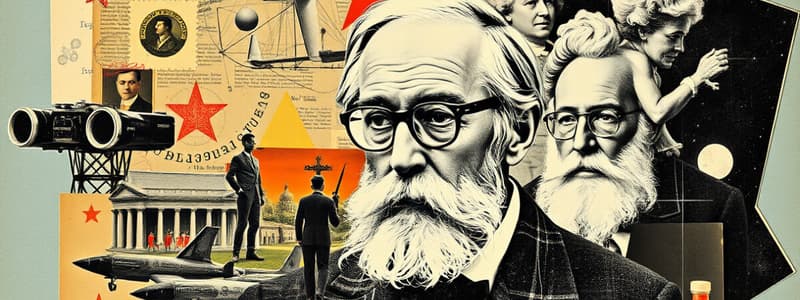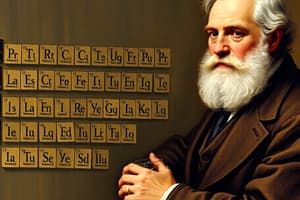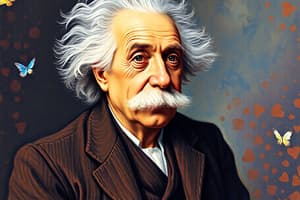Podcast
Questions and Answers
Charles Darwin was a French chemist known for his contributions to evolutionary theory.
Charles Darwin was a French chemist known for his contributions to evolutionary theory.
False (B)
Louis Pasteur's research established the importance of vaccines and hygiene standards.
Louis Pasteur's research established the importance of vaccines and hygiene standards.
True (A)
Albert Einstein was a key figure in the Scientific Revolution and is primarily known for his theories of relativity.
Albert Einstein was a key figure in the Scientific Revolution and is primarily known for his theories of relativity.
True (A)
Marie Curie was awarded a single Nobel Prize for her research in radioactivity.
Marie Curie was awarded a single Nobel Prize for her research in radioactivity.
Isaac Newton is recognized for his contributions to biology and is often cited in discussions about the germ theory.
Isaac Newton is recognized for his contributions to biology and is often cited in discussions about the germ theory.
Isaac Newton developed the theory of evolution through natural selection.
Isaac Newton developed the theory of evolution through natural selection.
Albert Einstein introduced the theory of relativity and contributed to quantum mechanics.
Albert Einstein introduced the theory of relativity and contributed to quantum mechanics.
Marie Curie was the first woman to win a Nobel Prize for her work on radioactivity.
Marie Curie was the first woman to win a Nobel Prize for her work on radioactivity.
Pasteur's Germ Theory identified microorganisms as the cause of disease.
Pasteur's Germ Theory identified microorganisms as the cause of disease.
Darwin's Finch Studies provided evidence for the static nature of species.
Darwin's Finch Studies provided evidence for the static nature of species.
Flashcards are hidden until you start studying
Study Notes
Contributions To Science
- Isaac Newton: Formulated laws of motion and universal gravitation; developed calculus.
- Albert Einstein: Introduced the theory of relativity; contributed to quantum mechanics and cosmology.
- Marie Curie: Pioneered research on radioactivity; first woman to win a Nobel Prize.
- Charles Darwin: Developed the theory of evolution through natural selection; published "On the Origin of Species."
- Louis Pasteur: Founded microbiology; developed pasteurization and vaccines for rabies and anthrax.
Scientific Discoveries
- Newton's Laws of Motion: Described the relationship between a body and the forces acting upon it.
- Einstein's Mass-Energy Equivalence (E=mc²): Established the link between mass and energy.
- Curie's Radioactive Elements: Discovered polonium and radium, enhancing understanding of atomic structure.
- Darwin's Natural Selection: Explained how species evolve and adapt over generations.
- Pasteur's Germ Theory: Revolutionized medical practices by identifying microorganisms as the cause of disease.
Famous Experiments
- Newton's Prism Experiment: Demonstrated that white light is composed of various colors.
- Einstein's Thought Experiments: Explored concepts of time dilation and the speed of light.
- Curie's Radioactivity Experiments: Investigated the properties of radioactive substances, leading to safety protocols.
- Darwin's Finch Studies: Observed variations in beak shapes among finches, providing evidence for adaptive evolution.
- Pasteur's Swanneck Flask Experiment: Showed that sterilized broth remained free of microorganisms unless exposed to air.
Historical Impact
- Newton: Laid the groundwork for classical mechanics, influencing engineering and physics for centuries.
- Einstein: Altered the understanding of space and time; influenced modern physics and technology.
- Curie: Advanced medical treatments and safety standards in handling radioactive materials.
- Darwin: Changed perspectives on life sciences, leading to debates in biology, religion, and philosophy.
- Pasteur: Established hygiene standards and the importance of vaccines, improving public health.
Biographies
- Isaac Newton (1643-1727): English mathematician and physicist; key figure in the Scientific Revolution.
- Albert Einstein (1879-1955): German-born theoretical physicist; known for his work in physics and philosophy.
- Marie Curie (1867-1934): Polish-born physicist and chemist; notable for her research in radioactivity and double Nobel laureate.
- Charles Darwin (1809-1882): English naturalist; his voyage on the HMS Beagle led to the formulation of evolutionary theory.
- Louis Pasteur (1822-1895): French chemist and microbiologist; his discoveries in germ theory led to breakthroughs in medicine and hygiene.
Contributions To Science
- Isaac Newton formulated the laws of motion and universal gravitation, and he developed calculus, revolutionizing mathematics and physics.
- Albert Einstein introduced the theory of relativity and made significant contributions to quantum mechanics and cosmology, fundamentally changing our understanding of space and time.
- Marie Curie conducted pioneering research on radioactivity, becoming the first woman to win a Nobel Prize for her contributions to science.
- Charles Darwin developed the theory of evolution through natural selection, with his landmark publication "On the Origin of Species" influencing biology and other fields.
- Louis Pasteur founded the field of microbiology, developing pasteurization and vaccines for rabies and anthrax, shaping modern medicine.
Scientific Discoveries
- Newton's Laws of Motion describe the relationship between a body and the forces acting on it, forming the basis for classical mechanics.
- Einstein's mass-energy equivalence formula (E=mc²) established a monumental connection between mass and energy, influencing physics and cosmology.
- Curie's discovery of the radioactive elements polonium and radium enhanced the understanding of atomic structure and radioactivity.
- Darwin's principle of natural selection illustrates how species evolve and adapt over generations, providing a framework for evolutionary biology.
- Pasteur's germ theory revolutionized medical practices by identifying microorganisms as the primary cause of disease, leading to hygiene and sterilization standards.
Famous Experiments
- Newton's prism experiment demonstrated that white light is made up of different colors, proving the phenomenon of dispersion.
- Einstein's thought experiments explored critical concepts like time dilation and the limitations of speed in the context of the theory of relativity.
- Curie's experiments on radioactivity investigated the properties of radioactive substances, leading to essential safety protocols in laboratories.
- Darwin's studies on finches observed variations in beak shapes, which provided compelling evidence for adaptive evolution based on environmental pressures.
- Pasteur's swanneck flask experiment showed that sterilized broth remained free of microorganisms, debunking the theory of spontaneous generation and highlighting the importance of air exposure.
Historical Impact
- Newton's contributions laid the groundwork for classical mechanics and influenced various engineering fields and physical sciences for centuries.
- Einstein's theories altered the fundamental understanding of space and time, significantly impacting modern physics and influencing technologies like GPS.
- Curie's work advanced medical treatments and established safety standards for handling radioactive materials, which changed medical practice.
- Darwin's theory transformed perspectives in life sciences, sparking debates in biology, religion, and philosophy, and shaping modern evolutionary theory.
- Pasteur's establishment of hygiene standards and vaccination importance significantly improved public health and laid the foundation for future medical practices.
Biographies
- Isaac Newton (1643-1727) was an English mathematician and physicist, recognized as a key figure in the Scientific Revolution for his groundbreaking work in natural philosophy.
- Albert Einstein (1879-1955) was a German-born theoretical physicist famed for his contributions to physics and philosophy, particularly in developing the theory of relativity.
- Marie Curie (1867-1934) was a Polish-born physicist and chemist, noted for her pioneering research in radioactivity and as a double Nobel Prize laureate.
- Charles Darwin (1809-1882) was an English naturalist whose voyage on the HMS Beagle led to the formulation of the theory of evolution, fundamentally altering biological science.
- Louis Pasteur (1822-1895) was a French chemist and microbiologist whose discoveries in germ theory led to major breakthroughs in medicine and public health practices.
Studying That Suits You
Use AI to generate personalized quizzes and flashcards to suit your learning preferences.




